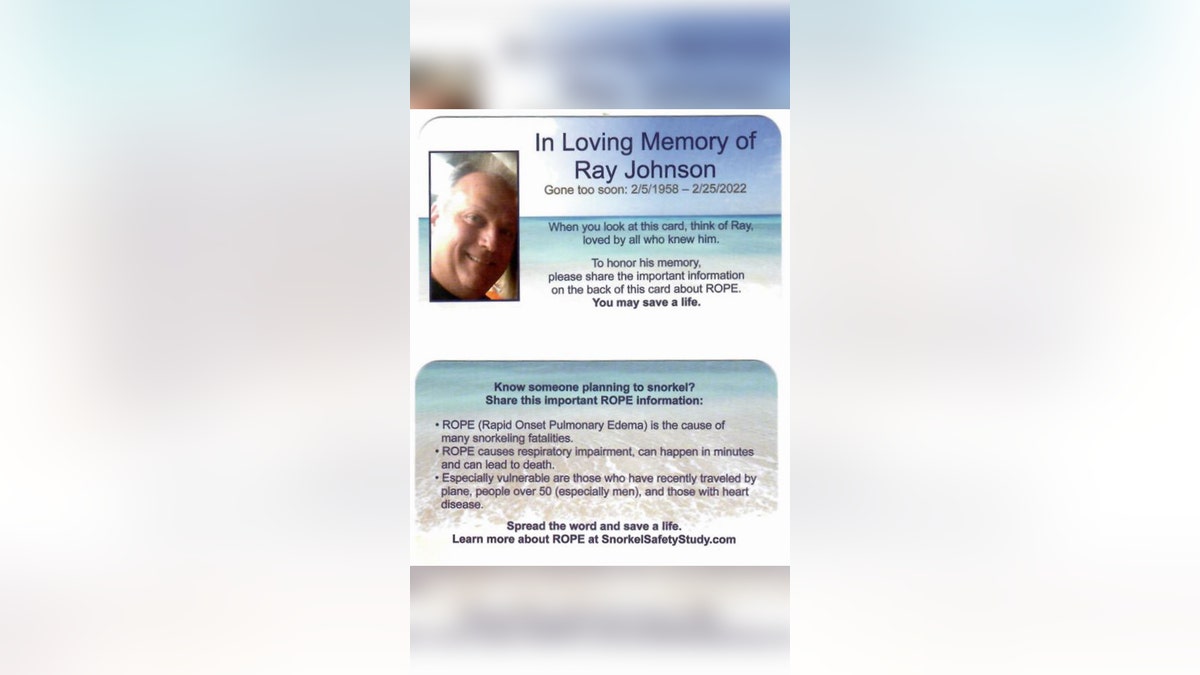Fox News Flash top headlines for May 9
Fox News Flash top headlines are here. Check out what's clicking on Foxnews.com.
A Michigan woman claims her husband's death could have been prevented by an awareness campaign about a little-known snorkeling danger, according to her lawsuit against the Hawaii Tourism Authority and the Hawaii Visitors Convention Bureau.
Officially, 64-year-old Ray Johnson's cause of death in February 2022 was ruled drowning, the leading cause of death for tourists in Hawaii, by a coroner, according to Patti Johnson's lawsuit.
But her attorney, Jay Stuemke, told Fox News Digital the experienced snorkeler's last moments did not resemble a traditional drowning at all.
"He told a friend, ‘I’m having trouble breathing,' and they tried to bring him in," Stuemke said Wednesday. "A friend helped him to shore, but he died on the beach [in Maui.]"

Patti Johnson is pictured with late husband Ray Johnson, who died at 64 Feb. 25, 2022, off the coast of Maui. (Provided by Patti Johnson)
Rather than aspirating water, Stuemke said Johnson likely died of Rapid Onset Pulmonary Edema, or ROPE, sometimes known as "drowning from the inside." When Rapid Onset Pulmonary Edema comes on, the swimmer's lungs fill with bodily fluids, reducing the organs' ability to deliver oxygen and leading to hypoxia.
Sufferers panic, become weak and often fall unconscious. The sudden onset of the condition can be so intense that snorkelers are unable to signal for help, and death can occur in just minutes, according to an editorial in the Honolulu Star Advertiser by pulmonologist Dr. Phillip R. Foti.
"It didn't make sense when I received the autopsy report that just said … drowning," Patti Johnson, Ray's wife, told ABC 7. "And I was like, I was watching him come in. When you're drowning, I don't think you're making your way in. I don't think you're talking to the people you're with."
A number of risk factors can contribute to ROPE deaths, among them the physiological effects of recent air travel, according to a study by the state Department of Health's Snorkel Safety Sub-Committee.
CRUISE SHIP DOCKS AT NEW YORK CITY PORT WITH 44-FOOT DEAD ENDANGERED WHALE CAUGHT ON ITS BOW

A man snorkels in the clear water of the Pacific Ocean at Carlsmith Beach Park Jan. 15, 2024, in Hilo, Hawaii. (Kevin Carter/Getty Images)
"Hypoxia induced by Rapid Onset Pulmonary Edema (ROPE) is the cause of some, probably most, snorkel related fatal and near fatal drownings," the study's authors wrote in their interim report, which is cited in Johnson's lawsuit.
Stuemke said waiting three days after disembarking from their plane before donning a snorkel can greatly reduce the risk of "preventable death."
Generally, tourists fly at least five hours to get to Hawaii, according to the study, and given that airplanes are pressurized at an equivalent of up to 8,500 feet elevation, "the permeability of the lung's membranes may be affected in a way that predisposes toward the development of ROPE."
"Ray should've been told that he was at particular risk of this for a variety of reasons, including the fact that he'd just flown in," Stuemke said. "They were going to be in there for two weeks. His wife has told me if they knew about this safety study and what it said, they would just hang out by the pool and drink Mai Tais for a couple days.
MOTHER OF AUSTRALIAN SURFERS KILLED IN MEXICO DELIVERS TOUCHING EUOLOGY AT SAN DIEGO BEACH

Patti and Ray Johnson are pictured in an undated photo. (Provided by Patti Johnson)
"Most people don't just come in for a weekend to snorkel. They come for a period of time and have a number of things they want to do," Steumke said. "If they're told they should wait, they will."
But according to Johnson's lawsuit, Hawaii's tourism authority and other groups have done little to forewarn tourists "despite having knowledge of the risks and ready-to-use warnings at hand from this industry-funded study."
"The [tourism authority hasn't] shared those warnings. They aren't prominently featured on any website or featured in any brochures or videos or anything," Stuemke said.
Between 2012 and 2021, 184 tourists died in snorkeling accidents compared to just 20 local residents.

Patti Johnson began giving these cards to anyone she meets who plans to go on a snorkeling trip, her attorney Jay Stuemke said. (Provided by Patti Johnson)
"It's impossible on autopsy to determine if someone died by a traditional drowning or this sudden onset pulmonary edema," Stuemke said. "Either way there's fluid in your lungs and a lack of oxygen."
Two factors make ROPE deaths more common for snorkelers than those participating in other water activities, according to the 2017 study — the swimmer's prone position in the water and the narrow tube of their snorkels, which creates resistance to inhalation.
Dr. Foti wrote in his findings that "[g]enerally, the simpler the snorkel the less resistance it generated."
However, "other factors, sometimes not visible, such as the size at the narrowest opening or the design of the valves, made visual determination of resistance unreliable."
The Hawaii House of Representatives attempted to pass a bill that would require first responders to record data on the types of snorkels used by tourists who drowned during the activity. But the bill was never passed, according to the Hawaii State Legislature website.
The type of mask and snorkel used were only recorded in 16% of snorkeling-related deaths, Foti wrote.
CLICK HERE TO GET THE FOX NEWS APP
While a full face mask was used in five of these cases and a traditional two-piece mask was used in eleven, the 2017 study noted that full face masks can't be removed in urgent situations, and users can't "spit" their snorkel out to improve their breathing.
Stuemke said Patti had begun to print small cards with details about ROPE. In doing so, she "has been, in a very real way, doing more to try to educate about this than what the state of Hawaii and the tourism industry have done."
"Any time she hears someone is going on a snorkeling trip, she gives someone one of these cards and says, 'Please, don't let what happened to Ray happen to you. Wait awhile and follow these other tips,'" Stuemke said.
The Hawaii Tourism Authority, Hawaii Visitors and Convention Bureau, the Fairmont Kea Lani Maui and Accor Management did not respond to a request for comment on the pending lawsuit.



